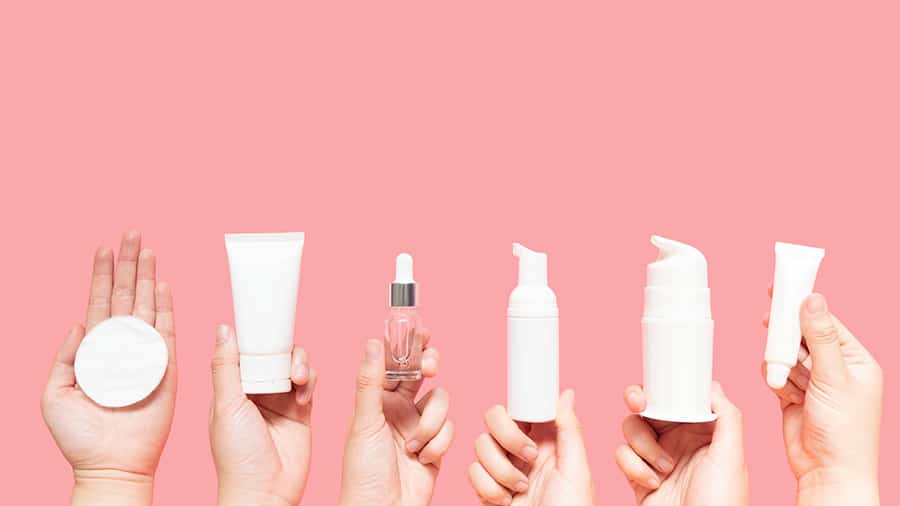The cosmetics sector accrued €24 billion in France in 2018, 26.7% of which was for beauty and skin care products. It is therefore a very promising sector. However, launching and developing your cosmetics brand involves following some best practices: from market research to marketing your products and building your brand identity.
France: a rapidly changing cosmetics market
In France, the cosmetics market experienced a significant decline due to the Covid-19 pandemic and lock downs. This applies especially to make-up products . At the same time, consumers – and especially female consumers – have turned to more natural, skin care-oriented formulas. The future looks bright for this type of cosmetics, especially for those for which special attention was paid to their composition. Certified organic labels, the Cosmébio label or those noting the absence of sulphates are very strong selling points. The nature of the packaging is also increasingly important. Recyclable materials – such as plant-based plastics made from sugar cane, for example – are on the rise.
Before the crisis, France ranked number 2 in the organic cosmetics market in Europe with €450 million in sales in 2018 (out of a global market of €8.8 billion). This type of skincare product, containing natural active ingredients, is therefore a good source of income, provided that the right customers are targeted and the product is original. Do not hesitate to ask for help and accompaniment during the creation of your cosmetics company.
Creating a successful cosmetics brand in 10 steps
Carry out a market study
Market research is the foundation of your success. Study your competition, their strategies and their positioning on the key cosmetic product(s) you plan to market. This will tell you whether your project is viable and how to adjust it to fill an under-exploited or niche market.
Keep in mind that market research should be as accurate as possible. And include as many figures as possible. It will be useful for drawing up your business plan and for attracting banks and potential investors.
Develop a business plan
Drawing up your business plan means knowing the different items of expenditure required to set up your business. You must not neglect anything: the price of raw materials, the rent for your premises, the price of your website, the cost of testing before market, etc. Be as exhaustive as possible.
Look for funding
Funding can be provided through a number of channels: from traditional bank loans to public grants, crowdfunding, or fundraising. Consider the repayment terms carefully and include these sums in your business plan.
Define brand values to target the right consumers
What are the values you wish to convey through your cosmetics brand? Which socio-demographic profile(s) do you want to target? Which brand name will you choose? These are all questions to which you will have to provide a precise answer. Your marketing, sales channels and pricing strategy must be in-line with your values and that of your target audience, as well as help convey your brand identity.
Choose your suppliers and distribution channels
The choice of suppliers for your raw materials is crucial. This is especially true if you are starting out in organic and certified organic cosmetics. You need to be sure of the traceability of the active ingredients used, their quality, the way they are harvested and packaged, and the regularity of their availability. Especially if you use seasonal or exotic plants.
Also establish your main distribution channels. At first, you can set up an e-commerce business and sell only online. Or you can simultaneously sell in physical shops, specialised shops or supermarkets. It all depends on your positioning and your target audience. If your audience are young and connected, online sales are a must. If they are older and less urban, a mix of e-commerce and shop seems more realistic.
Develop and test products
The development of cosmetic products is a key step. You need to surround yourself with experts and engage the services of a laboratory. The testing phase is also important. It is up to you to select the right panel of people. In Europe, marketing authorisation is subject to very strict rules. This is done in particular through the product information file (PIF) and through various mentions on the packaging: cautions for use, claims, list of ingredients, contents, function of the product, etc.
Choose your marketing strategy
Your marketing strategy should be finely tuned to your market research and brand style. What levers should you use? What are the habits of your targets? If they are connected, a good natural and paid referencing on your site, as well as communication via social networks, seem indispensable. Don’t neglect new consumer habits: smartphone use, impulse buying, attention to brand values, etc.
Implement the marketing strategy
Implementing your marketing strategy requires expert support, unless you have these skills in-house. But the creation of a new brand implies using multiple marketing levers to create your place in an already crowded cosmetics landscape. Outsource what you don’t know.
Think about the legal and judicial aspects
Do not neglect the legal and judicial aspects. In particular, the registration of your brand name at the INPI. Obtaining marketing authorisations for your products. Or an Ecocert and/or Cosmébio label, if you have decided to launch an organic cosmetics brand.
Need a professional translation?
Anticipate the future
Even if you are only planning to launch on the French market, start thinking about the internationalisation of your cosmetics brand. Have your website, brochures and packaging translated into at least English. Entrust the whole thing to expert translators to give you the best chance of success.
Note:
82% of cosmetic brands in France are family-owned. 67% are located outside the Paris region.
Source : https://www.febea.fr/en/le-secteur-cosmetique/key-figures-cosmetics-industry
When launching your cosmetics brand you may be confused by the size of the task. But taking it methodically, with confidence in the quality of your products and the support of marketing experts, success is attainable.







